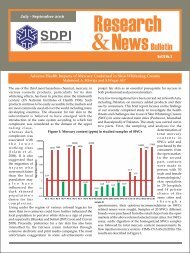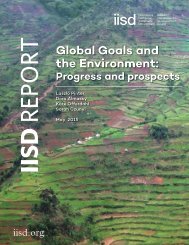Women and Chemicals
WomenAndChemicals_PublicationIWD2016
WomenAndChemicals_PublicationIWD2016
You also want an ePaper? Increase the reach of your titles
YUMPU automatically turns print PDFs into web optimized ePapers that Google loves.
Why women?<br />
laws, practices, attitudes <strong>and</strong> gender stereotypes, low levels of<br />
education, lack of access to health care <strong>and</strong> the disproportionate<br />
effect of poverty on women…”. 30<br />
<strong>Women</strong>’s participation is needed in all decision-making<br />
bodies, i.e. in parliament, government <strong>and</strong> the judiciary at local,<br />
regional <strong>and</strong> national level, <strong>and</strong> also in the executive<br />
boards of big (chemical) companies in order to have a real<br />
vote on banning hazardous chemicals or on adopting budgets<br />
for research on finding safe alternatives. States have to<br />
eliminate discriminatory legislation <strong>and</strong> prejudices, to remove<br />
de facto barriers for women’s participation <strong>and</strong> to raise awareness<br />
amongst decision-makers <strong>and</strong> the population as well as<br />
to empower women. <strong>Women</strong> also need to have more access<br />
to information, inter alia by guaranteeing proper access to information<br />
<strong>and</strong> communication technologies for girls <strong>and</strong><br />
women, even for those who may be marginalised, including<br />
indigenous women, women with disabilities or women from<br />
rural areas (see above).<br />
Access to resources<br />
<strong>Women</strong> often do not have access to resources, social protection <strong>and</strong><br />
finances, they are in a deprived position to deal with problems<br />
13







